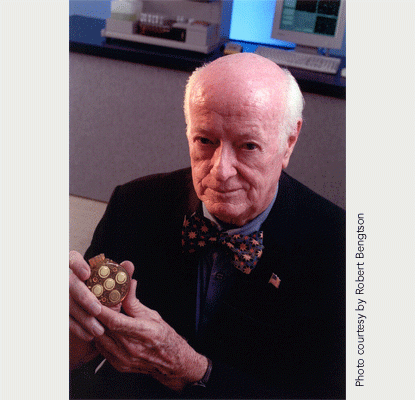William Murphy, Jr.
Combining a passion for mechanical engineering with his expertise in medicine, William Murphy, Jr. has revolutionized the biomedical industry. His inventions include significant improvements on the early cardiac pacemakers, artificial kidneys, cardiac catheters and disposable medical trays. Murphy collaborated with Dr. Carl Walter on the development of a flexible sealed blood bag for the transfusion of whole blood. Its first use was during the Korean War, where Murphy took the device to the battlefields and created a simple system for rapid, air-free transfusions.
Experience in the Korean War convinced Murphy that reuse of medical instruments was counter-productive, since they were often damaged or inadequately sterilized. He therefore designed a series of inexpensive medical trays equipped with drugs and sterilized tools that could be discarded after use, reducing cross-contamination of patients.
In the 1960s, Murphy directed engineers at his company, Cordis, to develop the first motor-driven high-pressure angiography injectors. Later, working with Robert Stevens, the company produced the first torque-controlled selective and disposable vascular diagnostic catheters.
Murphy, along with Cordis engineers, developed the first physiologic cardiac pacemaker (in the 1970s), which operated by responding to the heart's rhythms instead of at a fixed-rate. A later variation could be programmed non-invasively and led to the first DDD (dual chamber demand) pacemaker in the 1980s.
Murphy also guided the engineering of a new and efficient hemodializer (artificial kidney). This system, which mimics the natural kidney, allows for an increased surface to volume ratio, thus improving dialysis efficiency. Murphy's first company, Medical Development Corporation, was founded in his garage in 1957, and evolved into Cordis Corporation in 1959 (now a Johnson & Johnson company). He started Small Parts, Inc. in 1963 to quickly supply small batches of materials to engineers, and is currently the CEO there. From 1986-2003, he also guided Hyperion, Inc., a manufacturer of automated immunoassay systems and reagents.
The son of a Nobel laureate in medicine, Murphy first studied at Harvard College and later received his MD from the University of Illinois School of Medicine. Afterward, he studied mechanical engineering at the Massachusetts Institute of Technology. In 1989, he helped Dean Kamen establish the Foundation for Inspiration and Recognition of Science and Technology (FIRST). His many accolades include the American Institute of Medical and Biological Engineering Founding Fellow (1993) and the FIRST Founder's Award (2000).


